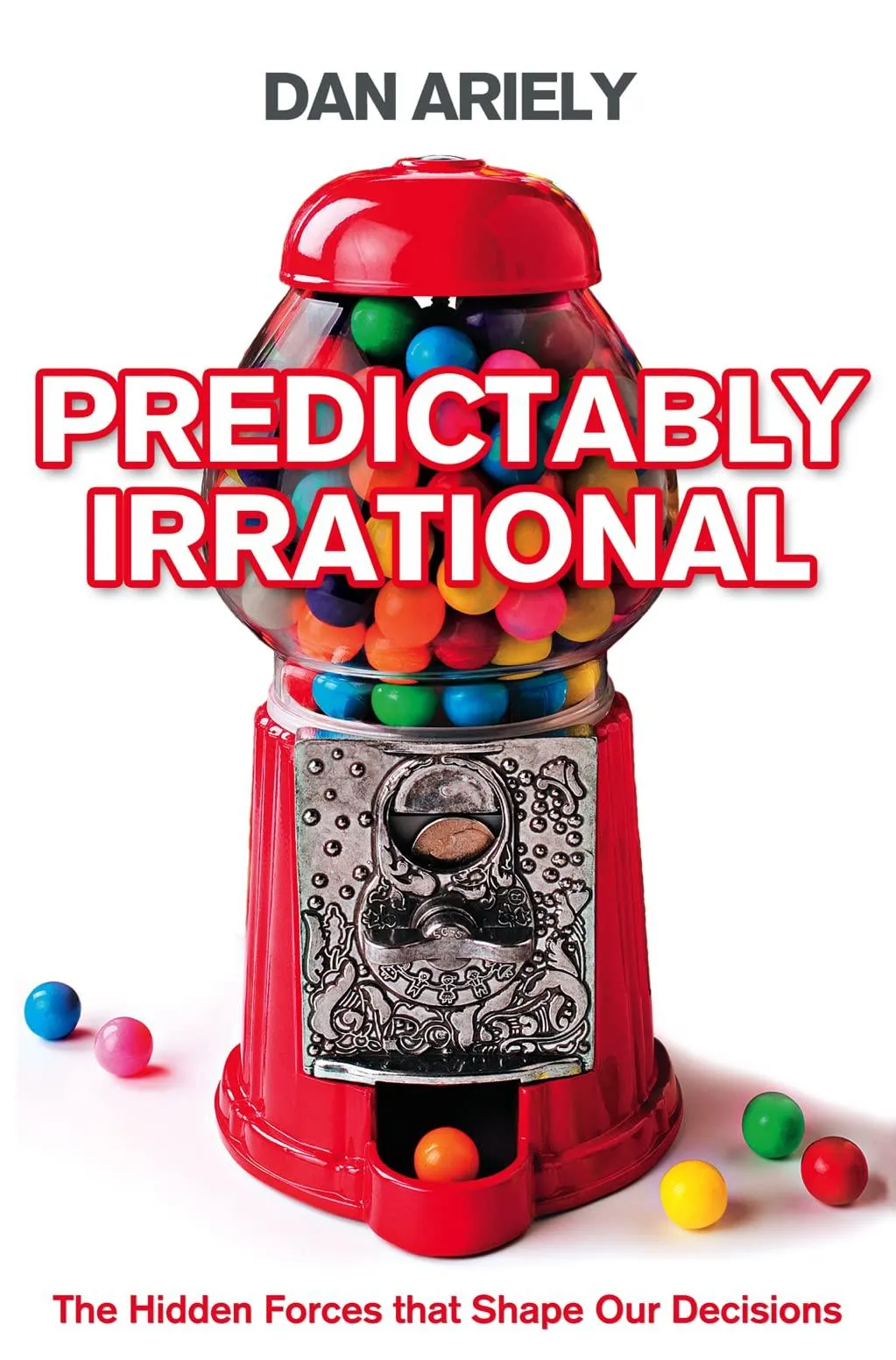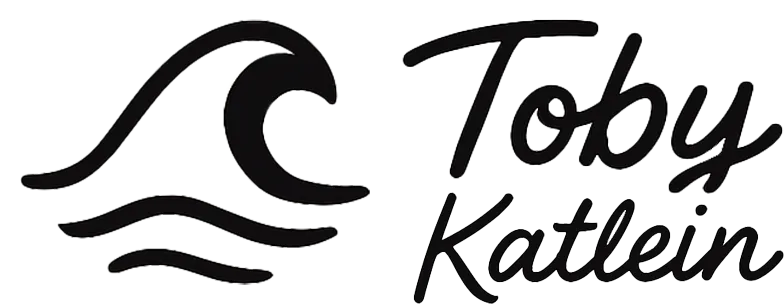
I'm on a mission to build things that connect
I'm on a mission to:
create deep connections with amazing people
And create deep connections with amazing people
My Latest Blog

Predictably Irrational - Notes & Summary
Overall, I give the book 3,5/5 stars. I liked it, there were some interesting concepts discussed, but it wasn't a page turner for me. Perhaps because the book's a bit older and I've read about many of the findings elsewhere. I do have one point of critique: many of the self-led "studies" he mentioned had very small sample sizes and although I respect his work and his findings in these studies do make sense, I wouldn't call it science. With that being said, there were plenty of studies with an appropriate number of participants and interesting nuggets here and there to make it worth a read.
Chapter One: The Truth About Reality
„Most people don't know what they want until they see it in context.”
We don't know what kind of X (e.g. shoes, house, lifestyle) we want until we see Y (e.g. a role model) with it.
Most people will take the mid-priced offer.
Lure people to buy the second most expensive option and make it highly profitable.
When presented with two options that are equally good but not easily comparable, (e.g. two different types of flowers that are equally beautiful and big and cost the same), option X becomes more attractive if there is a lesser version of it. (There are 2 different types of flowers and only three available: 2 of type A (1 damaged and 1 healthy) and 1 of type B -> The healthy type A flower seems more attractive as you have something to compare it to.
The lesser version is a decoy.
Once CEOs' salaries had to be made public, they skyrocketed. Ostensibly because of comparison. (the idea was to shame them for their high salary and nudge them lower)
Chapter Two: The Fallacy of Supply and Demand
Make something hard to get and people will want it.
Price anchors also work when the person is asked to name a minimum and maximum price they are willing to pay.
If the price anchor was high, people offered more or less.
A price anchor stays relevant even in a different context.
The first anchor holds more power than a second one.
In order to create a new anchor, one needs to make the attributes surrounding it drastically different from those of the first anchor.
Example: cheap Domino's pizza versus Italian restaurant. Yes, it's pizza, but the quality, ambience, and whole experience are very different.
Thus, a direct price comparison through the cheaper anchor of Domino's, (if that was the first exposure), becomes irrelevant.
How much of our current circumstance was influenced by early exposure to certain environments and behaviors anchoring us in our current world view?
Analyze your daily habits to see if they are still relevant.
How? Why did they start?
Analyze our anchors and their effects.
While the laws of supply and demand are valid, they can also be manipulated. (e.g. artificially limiting stock and exclusivity that have nothing to do with the quality of the product)
Chapter Three: The Cost of Zero Cost
Most transactions have an upside and a downside.
But when something is free, we forget the downside.
A free option will have significantly more allure, even if the second and better option is basically free.
Like offering product A for 1 cent versus product B for 2 cent VERUS product A for free versus product B for 1 cent. (the difference is just one cent in both scenarios but people would rather choose the free option even if they chose the 2 cent product before)
Same products but people choose 2 cent in the first scenario or free in the second scenario.
Chapter Four: The Cost of Social Norms
People work harder for a cause than cash.
Sometimes people would rather do something for free than for small amounts of money. (like helping someone with something. It would seem like an insult or just weird if you were paid 5€ for helping someone for 3 hours, even though nobody would complain about finding 5€ somewhere)
Small gifts as payments work much better than giving the amount of money that these gifts are worth, but only if the price of the gift is not revealed (even when it is easily assumed.)
When people think about money, even subconsciously, they become less helpful, more selfish, more self-reliant, and individualistic.
Employees become more loyal when the company offers social benefits and gifts rather than paying them more.
Chapter Five: The Influence of Arousal
While clear headed, we are very bad at predicting our decision-making skills under the influence of intense states, especially sexual arousal, but also anger and others.
We need to anticipate this and plan ahead. (lots of safe sex tips in this chapter like always bringing a condom to a date even when you are sure nothing will happen. If something does develop and you are both excited in the moment, the chance of a bad decision increases dramatically)
Chapter Six: The Problem of Procrastination and Self-Control
Self-chosen deadlines work.
Externally given ones work even better.
Self-control mechanisms that block or delay certain habits can help.
Chapter Seven: The High Price of Ownership
When we sell something personal, we value it more than if we were the buyer because we think of what we'll lose, like memories, rather than what we can do with the money we gain.
The feeling of ownership, even during a trial period or visualizing it, can have a powerful effect on keeping or buying something. (I had no interest in buying a fitness tracker before, but when I tried a Whoop band for free for 1 month and felt like it was mine, I felt a sense of loss after the trial was over. I ended up buying a Garmin a couple of weeks later because of that, even though I had no intention of buying a tracker before. I would have loved to keep the Whoop, but I wasn’t a fan of the subscription model.)
So try to imagine yourself as a non-owner to gain a clearer head when making a buying decision.
Chapter Eight: Keeping Doors Open
When we have too many options, or even just two that are very similar, we can become incapacitated to make a decision.
We let doors stay open just in case we might need them in the future, even when we are better off just making any decision, even if it isn't the best one. (I recently moved and couldn’t find a soap dispenser that I wanted. So I just used a plastic pre-filled one from the drugstore which gets the job done but looks ugly. The basic 6€ one from Ikea looked fine but it wasn’t “the one” I was looking for. It took half a year for me to just get the Ikea one so I could just switch it out once I find the one.)
Chapter Nine: The Effects of Expectations
The perceived taste of something can be influenced by the quality of the presentation. (in German we have the expression “die Augen essen mit“, which loosely translates to “the eyes also eat” i.e. the way food looks, adds to its taste)
If there is a weird feature to something, like an ingredient in a recipe, it won't make a difference to know about it once experienced.
But if they know about it before experiencing it, they will rate the experience worse.
In the book this was tested with beer. They compared normal beer with one that had a bit of vinegar added to it. In a blind test the one of vinegar tasted better, but when people knew about it before they drank they rated its taste worse
Reverse when it is a positive attribute like high-quality wine: knowing about it before consumptions enhances the experience.
People will enjoy a movie more if they are told it got great reviews.
The marketing and brand of Coca Cola make it taste better than Pepsi rather than the actual taste. (Pepsi was rated higher in a blind taste test)
Our own behavior and performance can be influenced by our stereotypes, like remembering you are introverted at a party. Telling yourself you are something can be a self-fulfilling prophecy
Subconsciously adding kind or opposite language influences behavior. (Priming)
Chapter Ten: The Power of Price
Two factors of placebo:
Belief that it works.
Conditioning (like Christmas trees = presents & family. Seeing them in a forest invites warm feelings even though it's just a tree.)
More expensive medicine can deliver better results even if budget ones have the same ingredients, unless you consciously acknowledge this irrationality.
Chapter Eleven & Twelve (Part One and Two): The Context of Our Character
When given the opportunity, people cheat, but even when there is a 0% chance they’ll get caught, they don’t go crazy with the cheating.
Reciting the Ten Commandments reduced the likelihood to cheat, even when the opportunity presented itself.
Dishonesty dramatically increases when there is a middleman or token that hides its true impact, like having points that can be exchanged for real money. (chips in a casino or swiping a debit card have less of an impact compared to using physical currency)
People add on average 10% more loss when claiming insurance.
Chapter Thirteen: Beer and Free Lunches
When people order out loud in sequence, they choose differently from when they order in private.
Not because of shame over unhealthy choices, but because they want to seem unique and not order the same thing as others. (the later in the sequence you are asked for your order the higher the chances you’ll change your order)
Need for uniqueness, even if the popular choice is better
can differ in cultures where it isn’t seen as positive to be unique.
Additional Notes on the Reflections in the back of the book
Meeting someone from your home country abroad or who speaks the same language can lead to deep bonding in that environment, but this can break once back in a familiar environment.
While giving friends gifts instead of money isn’t the best option from a logical standpoint as you can give something to someone they don’t enjoy and money offers flexibility, “they help us make friends and create long-term relationships that sustain us through life's ups and downs.”
So sometimes, a “waste of money” can be worth a lot.
When we are gifted a vacation worth $1,000 from our boss, it creates significantly more loyalty and increases employee happiness than a $1,000 bonus at the end of the year. Especially when your boss asks you to do overtime or solving work problems after work hours – you remember that vacation and other gifts they have given you while you may forget or take for granted a money bonus.
When offering benefits as a company, it's important not to add their monetary value to the paycheck (like giving someone a present and telling them how much you paid for it). It makes the gift or bonus transactional and not social. Let it speak for itself.
Unpredictable rewards motivate us more than predictable or pre-planned ones, like a bonus every 10 sales.
Be careful about the timing of positive or negative reinforcements so you don't associate bad or good results with good or bad behavior.
My Latest Youtube Video

Predictably Irrational - Notes & Summary
Overall, I give the book 3,5/5 stars. I liked it, there were some interesting concepts discussed, but it wasn't a page turner for me. Perhaps because the book's a bit older and I've read about many of the findings elsewhere. I do have one point of critique: many of the self-led "studies" he mentioned had very small sample sizes and although I respect his work and his findings in these studies do make sense, I wouldn't call it science. With that being said, there were plenty of studies with an appropriate number of participants and interesting nuggets here and there to make it worth a read.
Chapter One: The Truth About Reality
„Most people don't know what they want until they see it in context.”
We don't know what kind of X (e.g. shoes, house, lifestyle) we want until we see Y (e.g. a role model) with it.
Most people will take the mid-priced offer.
Lure people to buy the second most expensive option and make it highly profitable.
When presented with two options that are equally good but not easily comparable, (e.g. two different types of flowers that are equally beautiful and big and cost the same), option X becomes more attractive if there is a lesser version of it. (There are 2 different types of flowers and only three available: 2 of type A (1 damaged and 1 healthy) and 1 of type B -> The healthy type A flower seems more attractive as you have something to compare it to.
The lesser version is a decoy.
Once CEOs' salaries had to be made public, they skyrocketed. Ostensibly because of comparison. (the idea was to shame them for their high salary and nudge them lower)
Chapter Two: The Fallacy of Supply and Demand
Make something hard to get and people will want it.
Price anchors also work when the person is asked to name a minimum and maximum price they are willing to pay.
If the price anchor was high, people offered more or less.
A price anchor stays relevant even in a different context.
The first anchor holds more power than a second one.
In order to create a new anchor, one needs to make the attributes surrounding it drastically different from those of the first anchor.
Example: cheap Domino's pizza versus Italian restaurant. Yes, it's pizza, but the quality, ambience, and whole experience are very different.
Thus, a direct price comparison through the cheaper anchor of Domino's, (if that was the first exposure), becomes irrelevant.
How much of our current circumstance was influenced by early exposure to certain environments and behaviors anchoring us in our current world view?
Analyze your daily habits to see if they are still relevant.
How? Why did they start?
Analyze our anchors and their effects.
While the laws of supply and demand are valid, they can also be manipulated. (e.g. artificially limiting stock and exclusivity that have nothing to do with the quality of the product)
Chapter Three: The Cost of Zero Cost
Most transactions have an upside and a downside.
But when something is free, we forget the downside.
A free option will have significantly more allure, even if the second and better option is basically free.
Like offering product A for 1 cent versus product B for 2 cent VERUS product A for free versus product B for 1 cent. (the difference is just one cent in both scenarios but people would rather choose the free option even if they chose the 2 cent product before)
Same products but people choose 2 cent in the first scenario or free in the second scenario.
Chapter Four: The Cost of Social Norms
People work harder for a cause than cash.
Sometimes people would rather do something for free than for small amounts of money. (like helping someone with something. It would seem like an insult or just weird if you were paid 5€ for helping someone for 3 hours, even though nobody would complain about finding 5€ somewhere)
Small gifts as payments work much better than giving the amount of money that these gifts are worth, but only if the price of the gift is not revealed (even when it is easily assumed.)
When people think about money, even subconsciously, they become less helpful, more selfish, more self-reliant, and individualistic.
Employees become more loyal when the company offers social benefits and gifts rather than paying them more.
Chapter Five: The Influence of Arousal
While clear headed, we are very bad at predicting our decision-making skills under the influence of intense states, especially sexual arousal, but also anger and others.
We need to anticipate this and plan ahead. (lots of safe sex tips in this chapter like always bringing a condom to a date even when you are sure nothing will happen. If something does develop and you are both excited in the moment, the chance of a bad decision increases dramatically)
Chapter Six: The Problem of Procrastination and Self-Control
Self-chosen deadlines work.
Externally given ones work even better.
Self-control mechanisms that block or delay certain habits can help.
Chapter Seven: The High Price of Ownership
When we sell something personal, we value it more than if we were the buyer because we think of what we'll lose, like memories, rather than what we can do with the money we gain.
The feeling of ownership, even during a trial period or visualizing it, can have a powerful effect on keeping or buying something. (I had no interest in buying a fitness tracker before, but when I tried a Whoop band for free for 1 month and felt like it was mine, I felt a sense of loss after the trial was over. I ended up buying a Garmin a couple of weeks later because of that, even though I had no intention of buying a tracker before. I would have loved to keep the Whoop, but I wasn’t a fan of the subscription model.)
So try to imagine yourself as a non-owner to gain a clearer head when making a buying decision.
Chapter Eight: Keeping Doors Open
When we have too many options, or even just two that are very similar, we can become incapacitated to make a decision.
We let doors stay open just in case we might need them in the future, even when we are better off just making any decision, even if it isn't the best one. (I recently moved and couldn’t find a soap dispenser that I wanted. So I just used a plastic pre-filled one from the drugstore which gets the job done but looks ugly. The basic 6€ one from Ikea looked fine but it wasn’t “the one” I was looking for. It took half a year for me to just get the Ikea one so I could just switch it out once I find the one.)
Chapter Nine: The Effects of Expectations
The perceived taste of something can be influenced by the quality of the presentation. (in German we have the expression “die Augen essen mit“, which loosely translates to “the eyes also eat” i.e. the way food looks, adds to its taste)
If there is a weird feature to something, like an ingredient in a recipe, it won't make a difference to know about it once experienced.
But if they know about it before experiencing it, they will rate the experience worse.
In the book this was tested with beer. They compared normal beer with one that had a bit of vinegar added to it. In a blind test the one of vinegar tasted better, but when people knew about it before they drank they rated its taste worse
Reverse when it is a positive attribute like high-quality wine: knowing about it before consumptions enhances the experience.
People will enjoy a movie more if they are told it got great reviews.
The marketing and brand of Coca Cola make it taste better than Pepsi rather than the actual taste. (Pepsi was rated higher in a blind taste test)
Our own behavior and performance can be influenced by our stereotypes, like remembering you are introverted at a party. Telling yourself you are something can be a self-fulfilling prophecy
Subconsciously adding kind or opposite language influences behavior. (Priming)
Chapter Ten: The Power of Price
Two factors of placebo:
Belief that it works.
Conditioning (like Christmas trees = presents & family. Seeing them in a forest invites warm feelings even though it's just a tree.)
More expensive medicine can deliver better results even if budget ones have the same ingredients, unless you consciously acknowledge this irrationality.
Chapter Eleven & Twelve (Part One and Two): The Context of Our Character
When given the opportunity, people cheat, but even when there is a 0% chance they’ll get caught, they don’t go crazy with the cheating.
Reciting the Ten Commandments reduced the likelihood to cheat, even when the opportunity presented itself.
Dishonesty dramatically increases when there is a middleman or token that hides its true impact, like having points that can be exchanged for real money. (chips in a casino or swiping a debit card have less of an impact compared to using physical currency)
People add on average 10% more loss when claiming insurance.
Chapter Thirteen: Beer and Free Lunches
When people order out loud in sequence, they choose differently from when they order in private.
Not because of shame over unhealthy choices, but because they want to seem unique and not order the same thing as others. (the later in the sequence you are asked for your order the higher the chances you’ll change your order)
Need for uniqueness, even if the popular choice is better
can differ in cultures where it isn’t seen as positive to be unique.
Additional Notes on the Reflections in the back of the book
Meeting someone from your home country abroad or who speaks the same language can lead to deep bonding in that environment, but this can break once back in a familiar environment.
While giving friends gifts instead of money isn’t the best option from a logical standpoint as you can give something to someone they don’t enjoy and money offers flexibility, “they help us make friends and create long-term relationships that sustain us through life's ups and downs.”
So sometimes, a “waste of money” can be worth a lot.
When we are gifted a vacation worth $1,000 from our boss, it creates significantly more loyalty and increases employee happiness than a $1,000 bonus at the end of the year. Especially when your boss asks you to do overtime or solving work problems after work hours – you remember that vacation and other gifts they have given you while you may forget or take for granted a money bonus.
When offering benefits as a company, it's important not to add their monetary value to the paycheck (like giving someone a present and telling them how much you paid for it). It makes the gift or bonus transactional and not social. Let it speak for itself.
Unpredictable rewards motivate us more than predictable or pre-planned ones, like a bonus every 10 sales.
Be careful about the timing of positive or negative reinforcements so you don't associate bad or good results with good or bad behavior.
My Favourite Project
Sound on! ;)
The Book Club
📚
1. We Pick A Book
We vote for one book out of 3 suggestions. The book with the most votes wins.
📖
2. We Read It
We read the book over the course of a month, sometimes together.
💬
3. We Meet IRL
After a short ice breaker, we discuss what we learned and how we will implement it.
Message me
FAQs
Why did you create this website?
I wanted something where I could express myself that was truly my own. No algorithms, not likes and followers, just pure authentic creation without the need for validation.
What do you actually do?
Haha, depends who's asking.
Who do you look up to?
Richard Branson.
Favourite soup?
Pumpkin or sweet potato




